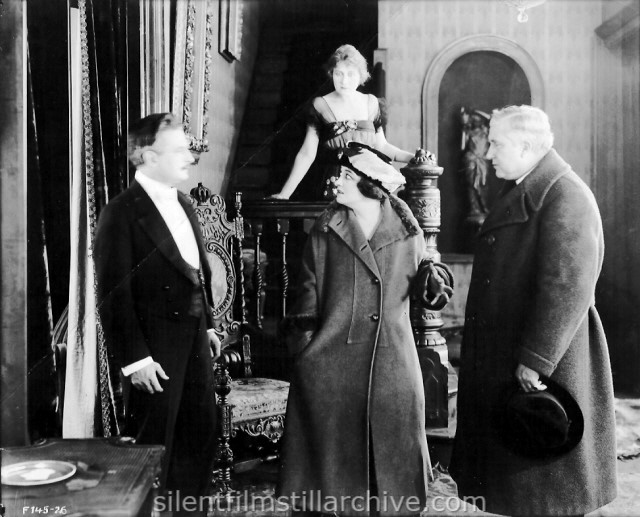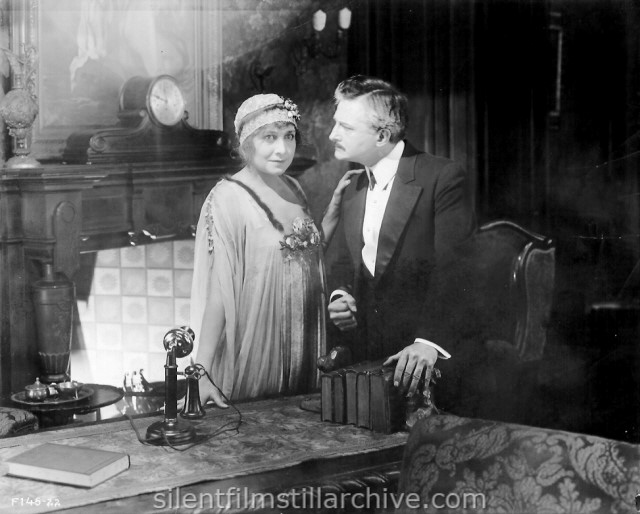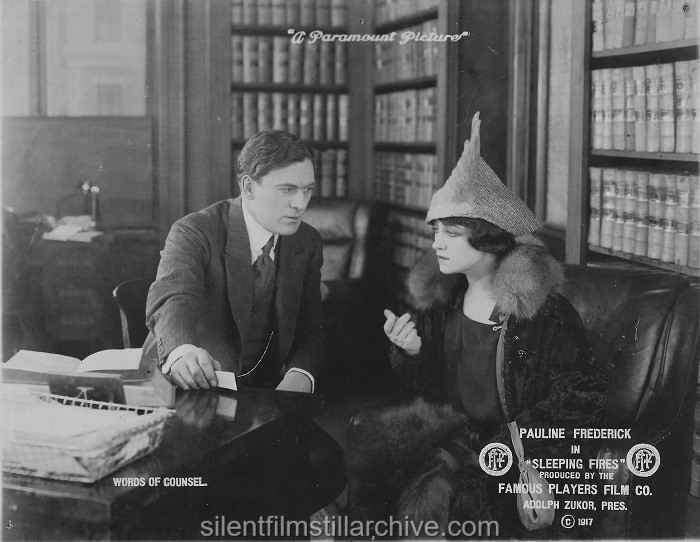![]()

Sleeping Fires (1917)

F145-26 John Sainpolis, Pauline Frederick, and Joseph Smiley. The woman on the stairs is unidentified, but could be Helen Dahl.

F145-22 Helen Dahl (?) and John Sainpolis.Helen Dahl (?) and John Sainpolis.

Thomas Meighan and Pauline Frederick
A Paramount Picture
Words of counsel.
PAULINE FREDERICK in "SLEEPING FIRES"
Produced by the FAMOUS PLAYERS FILM CO.
Adolph Zukor, Pres.
(c) 1917
PARAMOUNT THEATRE
This evening a powerful drama entitled "Sleeping Fires," featuring Pauline Frederick, is to be shown at the Paramount Theatre. It is described as one of the most remarkable dramas in which this talented artist has appeared. The story is: one of a man, Edwin Bryce, who, in love with his secretary, Helen King, is desirous of obtaining a divorce from his wife (Pauline Frederick). Knowing that divorce is contrary to his wife's religion, the knavish husband uses their little son as a lever, promising him: to her only in the event of a dissolution of the marriage. Later on the husband is accidentally shot, and his wife is accused of the crime. Matters look black for her, various persons conspiring for her conviction. Fate moves in the dark, and at a critical moment a most unexpected witness, in the wife's favour crops up, and the story, a charming one, ends happily.This evening a powerful drama entitled "Sleeping Fires," featuring Pauline Frederick, is to be shown at the Paramount Theatre. It is described as one of the most remarkable dramas in which this talented artist has appeared. The story is: one of a man, Edwin Bryce, who, in love with his secretary, Helen King, is desirous of obtaining a divorce from his wife (Pauline Frederick). Knowing that divorce is contrary to his wife's religion, the knavish husband uses their little son as a lever, promising him: to her only in the event of a dissolution of the marriage. Later on the husband is accidentally shot, and his wife is accused of the crime. Matters look black for her, various persons conspiring for her conviction. Fate moves in the dark, and at a critical moment a most unexpected witness, in the wife's favour crops up, and the story, a charming one, ends happily.
-- The Evening Post, Sept. 29, 1917, Wellington, New Zealand
'SLEEPING FIRES' AT THE GAIETY
A Story of Universal Appeal Dealing with Greatest of Human Emotions
PAULINE FREDERICK in "Sleeping Fires," the headline attraction at the Gaiety Theatre for the first half of the week, is a story of universal appeal, dealing with the greatest of human emotions, a mother's love. Miss Frederick takes the part of Zelma Bryce, a women whose religion, prevents her from accepting a divore (sic) and whose intense devotion and affection for her little son, known in the picture as "The Little Fellow," cause her to display the claws of the primitive tiger-woman, when attached through her child. Her unprincipled husband, Edward Bryce, is in love with his young secretary, Helen King, and is willing to sacrifice all to marry her. They plan to influence Mrs. Bryce through "the little fellow," and a relentless nurse is hired to guard him, and keep him away from his mother. The latter, desperate, strives to forget, and take up social settlement work, meeting in this way a young lawyer who gains her confidence. Mrs. Bryce steals the child from the husband, being unable to wait for the decision of the court. In a quarrel which ensues, the husband is accidentaly (sic) shot. The young wife is accused of the crime. Gray defends her in a long trial, during which the mother thinks many times, that she has reached the limits of endurance. It finally results in the verdict, "Not guilty," and the innocent mother is at length free to take up the threads of her broken life again with Gray and "the little fellow," who has also suffered during the long separation.
-- The Evening Tribune, June 24, 1917, Providence, Rhode Island, USA
Quartet of Stars on Paramount April List
On April 30, "Sleeping Fires," with Pauling Frederick, will be released. The character Miss Frederick plays in this screen drama is in direct contrast to her characterization of "Sappho," her last picture. She in the role of the wife of a tired and jaded manufacturer, who tries to banish her from his life. The sufferings of mind and body she endures therefrom is the plot of the story. Thomas Meighan and John Sainpolis, both of whom appeared in "Sappho," are members of the cast.
-- Motion Picture News, April 7, 1917, page 2180
"Sleeping Fires" Next Vehicle for Pauline Frederick
Pauline Frederick, whose most recent appearance was in "Sapho," is to play a completely different type of character in her next production, "Sleeping Fires," scheduled for release by Paramount, April 16.
Whereas "Sapho" was a heartless, uneducated seeker after pleasure, Zelma Bryce, the character assumed by Miss Frederick in the forthcoming Famous Players production, is a woman in high mentality and very evident refinement whose life is wrapped up in her little son. Her husband, attracted by a woman of an entirely different stamp, is doing everything in his power to force Mrs. Bryce to divorce him. Using the boy as a pawn in all his schemes, the frantic efforts of this devoted mother to keep the little chap in her possession, and the final arousing of her mother-love to a frenzy as she sees the boy being taken from her, give Miss Frederick great opportunity to display her powers.
-- Motion Picture News, April 14, 1917, page 2333
A FAMOUS PLAYERS production, "Sleeping Fires," the story of a self-sacrificing mother, with Pauline Frederick in the leading role, and a Pallas presentation, "The Lonesome Chap," in which Louise Huff and House Peters costar, are the two features on the Paramount program for the week of April 16.
Miss Frederick in "Sleeping Fires," to be released april 16, is seen as a woman of high mentality whose life is wrapped up in her young son. Her husband, attracted by a woman of entirely different stamp, is doing all in his power to force her to divorce him. The boy is used in the scheme as a pawn, and the star is given opportunity to display her emotional powers as the frantic mother determined to keep the child in her possession.
Hugh Ford directed the production, which as written by
George Middleton. In the supporting case are Thomas Meighan, John
Sainpolis, Helen Dahl and Joseph Smiley.
-- Motion Picture News, April 21st, 1917, page 2489
"Sleeping Fires"
(Famous Players-Paramount - Five Reels)
REVIEWED BY GEORGE N. SHOREY
THIS is quite a different role from Miss Frederick's recent parts, and we feel it will be received by the picture loving public, as one of her most important roles. Here she is the loyal mother, who refuses to allow her scheming and unscrupulous husband to obtain a divorce. In his effort to compel her he retains their child, and the story therefore hinges chiefly on the mother-love and near-desperation which results from his employing agents to keep the mother away from her child.
Those who have seen Miss Frederick in the several
different kinds of roles which this star has already proven she is past
master of will understand that this mother, seeking her child and finding
another woman living openly with her husband, has an intensely dramatic
role.
Miss Frederick fills this role, as she has all past roles, with utmost credit to herself. Her acting is finished, and to our mind as early perfect as the screen can portray. The beauty in her work is not the emotion she can show—we have seen in the past cases, she is equal to any emergency - but the repression of too wild an emotion, in keeping with the role of a refined even though utterly desperate woman.
Those who are looking for artistic work will find it in this play. We were not as fascinated by it as by some other bits of work we have seen Miss Frederick do, and we do not think the public will care as much for this play as some of the others, but it si well up among her very best, even judged by the box-office standard alone. Hugh Ford directed, and is entitles to full credit for a smooth presentation.
Little Maury Steuart, as the child, added much
enjoyment. He seemed to enjoy his part. Thomas Meighan made an ideal
lover lawyer.
THE STORY AND PLAYERS
Edwin Bryce (John Sainpolis), contemptible plutocrat and faithless to his wife (Pauline Frederick), tries to force her to divorce him after life with him as become unendurable because of his overbearing tyranny. He would prefer his office secretary (Helen Dahl) to his wife. He has no love even for their child (Maury Steuart), who is left to the heartless "control" of a nurse.
Zelma Bryce refuses to permit the divorce, for the sake of the child. Then she kidnaps the child. Bryce sends Joe Giles (Joseph Smiley) to get the child back, and the mother, frantic with grief, finds Giles and the bad woman in the Bryce home, but no sign of the child. Desperate, Zelma has brought a pistol, perhaps with the thought of scaring Bryce, and the bad woman tries to snatch the pistol from her, and it goes off and kills Bryce.
In court the jury acquits the mother after Joe Giles has weakened and confessed the true circumstances of the shooting.
-- Moving Picture News, April 2817, page 2687
On April 30 "Sleeping Fires" with Pauline Frederick will be released. The character Miss Frederick plays in this screen drama is in direct contrast to her characterization of "Sapho," her last picture. She is in the role of the wife of a tired and jaded manufacturer, who tries to banish her from his life. The sufferings of mind and body she endures therefrom is the plot of the story. Thomas Meighan and John Sainpolis, both of whom appeared in "Sapho," are members of the cast.
-- Motion Picture News, April 7, 1917, page 2180
"Sleeping Fires" Next Vehicle for Pauline Frederick
Pauling Frederick, whose most recent appearance was in "Sapho," is to play a completely different type of character in her next production, "Sleeping Fires," schedules for release by Paramount April 16.
Whereas "Sapho" was a heartless, uneducated seeker after pleasure, Zelma Bryce, the character assumed by Miss Frederick in the forthcoming Famous Players production, is a woman of high mentality and very evident refinement whose life is wrapped up in her little son. Her husband, attracted by a woman of an entirely different stamp, is doing everything in his power to force Mrs. Bryce to divorce him. Using the boy as a pawn in all his schemes, the frantic efforts of this devoted mother to keep the little chap in her possession, and the final arousing of her mother-love to a frenzy as she sees the boy being taken from her, give Miss Frederick great opportunity to display her powers.
-- Motion Picture News, April 14, 1927, page 2332
PAULINE FREDERICK AS SELF-SACRIFICING MOTHER.
Pauline Frederick, whose beauty and wonderful histrionic ability made her an ideal Sapho in the Famous Players adaption of the celebrated Daudet novel, is to play a completely different type of characer in her next production, "Sleeping Fires," which is scheduled for release by Paramount April 16.
Whereas Sapho was a heartless, uneducated seeker after pleasure, Zelma Bryce, the character assumbed by Miss Frederick in "Sleeping Fires" is a woman of high mentality and very evident refinement, whose life is wrapped up in her little son. Widely different from the character of Sapho in every respect, Mrs. Bryce is at the same time an intensely emotional woman who is forced by the cruelty of her husband to put away her finer sensibilities and to meet fire with fire. It is a doubly sympathetic characterization, and on which will show Pauline Frederick in a new light, even to her most devoted admirers. "Sleeping Fires" was written by George Middleton, the well-known playright and author, and was directed by Hugh Ford.
Among those in the cast are such well-known players as Thomas Meighan, John Sainpolis, Helen Dahl and Joseph Smiley.
-- Moving Picture World, April 14, 1917, page 297
"Sleeping Fires."
The Famous Players will release on April 16 "Sleeping Fires," a story by George Middleton. The subject is directed by Hugh Ford. Pauline Frederick has the leading role, that of Zelma Brice, a wife tied to a husband who bears that relation in name only. It is a story of the battle of a mother for the custody of her child, of a wife who has submitted to many indignities at the hands of a man whose name she bears. The picture has interest, enhanced by the portrayal of Miss Frederick, and strength as well.
Thomas Meighan is David Gray, a lawyer who by accident meets Mrs. Brice and becomes her counsel and her friend. Mr Meighan has a personality that fits the role. He makes a splendid opposite for Miss Frederick and plays his part with marked skill. John Sainpolis is Brice, the husband who, after the departure of his wife from her home, installs his "secretary" as his "housekeeper". Mr. Sainpolis makes of Brice a good, all-around, polished reprobate, deserving sympathy of no one. Helen Dahl is the unscrupulous "Secretary," who, in a scuffle with Mrs. Brice, so guides a pistol that when discharged it kills the head of the house. Joseph Smiley is the detective whose testimony at the trial of the wife brings about her acquittal. Maury Steuart is the child of the mismated pair.
There are situations that stand out. One of these is the suggestion to the attorney by the husband that the interest displayed by him in Mrs. Brice may not be wholly professional. It is an invitation to break the peace – and the invitation is accepted. The court scene is well staged. It is likely, though, that had the script been written by a lawyer he would have had a second attorney in charge of the case of the defendant. The first one was so deeply concerned in the outcome that he was ot in a mental attitude to get the best results for his client. It is all interesting, nevertheless, even to the spectacle of witnessing Miss Frederick in a submissive, non-combative mood – something of a novelty.
-- Moving Picture World, April 28, 1917, page 633-634
SLEEPING FIRES (Famous Players -- Five parts (sic) -- April 16.) – The cast includes Pauline Frederick, Thomas Meighan, John Sainpolis, Helen Dahl, Joseph Smiley and Maury Stewart.
Edwin Bryce is in love with his secretary, Helen King, and wants to get rid of his wife so that he can marry again. Zelma Bryce, his wife, refuses to grant him a divorce, saying it is against her religion.
There is a strike going on at this time among the
workers in a manufacturing concern of which her husband is the president.
The strike leaders gather in the streets and a riot starts. Mrs. Bryce
passes in her automobile and see the strikebreaker handing one of the
girls roughly. In behalf of the girls who are employed in the factory,
Mrs. Bryce goes to the magistrate's court. There she meets a young
lawyer, Robert Gray.
During her conversation with hime she makes known conditions of her matrimonial relations, which, shortly, result in a divorce. Wishing to gain possession of their little boy, she appeals to Gray for help. She finally steals the boy from the house. Her husband secures the service of a detective to bring him back.
Mrs. Bryce, going again to the house to get the boy, meets Miss King with her husband. A quarrel follows in which she kills her husband accidentally. The only witnesses are the detective and Miss King. Mrs. Bryce is forced to swear that she killed her husband because she is in love with Gray. At the trial, which comes later, it is sworn that she came to the house purposely to kill her husband. Gray defends her and later produces witnesses who completely vindicate her.
-- Moving Picture World, April 28, 1917, page 684
with Pauline Frederick, Thomas Meighan, and John Sainpolis. Directed by Hugh Ford. Famous Players/Paramount.
More Information on this film...
Books
(None).
This work (Sleeping Fires (1917), by Paramount), identified by Bruce Calvert, is free of known copyright restrictions..
Last Modified February 18, 2018




















